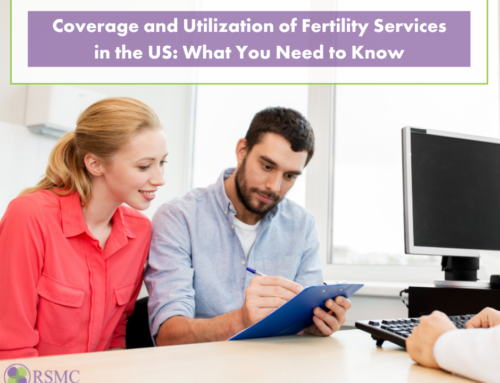One of the main things discouraging people from seeking fertility treatment is the high cost. According to the National Conference of State Legislation (NCSL), the average cost of an IVF cycle is $12,000. The Basic IVF package usually goes for around $10,000 to $15,000. This is excluding the costs of medication, which can range from $1,500 to $3,000 per cycle.
A 2013 study asked couples pursuing IVF to write down their out-of-pocket payments for 18 months, including the cost of IVF, medications, and monitoring. At the end of the study, the average couple shelled out $19,234 for IVF and an extra $6,955 for each additional cycle. This means that if a couple undergoes three IVF cycles, they will have to pay more than $33,000 out of their own pocket.
At times, infertility diagnosis is not the reason a lot of people cannot achieve their parenthood dreams; it is the lack of affordable fertility clinics, which makes IVF treatment and other family-building options inaccessible.
Unfortunately, infertility is an emotionally distressing condition, and when you add in the huge financial expenses that many people end up paying out of pocket, the effect of infertility can be even more devastating.
Since success is not guaranteed even with advanced high-tech IVF, some couples might require two or more IVF cycles to conceive. In the following discussion, we will look at how can you lower costs like these and get access to affordable IVF.
Schedule a Consultation
Affordable IVF : how can you lower costs
1. Price Shop and Negotiate
Aside from IVF success rates, there are other important things you will want to consider when selecting a fertility clinic. It’s best to choose a clinic that can offer you the treatment you need at an affordable price. Feel free to contact other clinics to learn about their offerings. Although it is natural to want to work with your own physician, you need to put your family’s financial health into consideration.
When weighing out prices, ask fertility clinics what is included in their packages and anything that is unclear. If you are considering two clinics and one appears to quote a higher price, but the fee covers the cost of blood work and ultrasound monitoring, know that you are comparing two completely different things. You may also decide to negotiate with a fertility clinic to see if you will get a better price.
Travel cost is another important factor that you will have to consider. You may like a fertility clinic, and they may offer you a reasonable price, but if the cost of going there and the lost income due to taking a break from work wound counterbalance the benefits, then you may need to rethink this approach.
2. Maximize Insurance for IVF by Understanding Your Benefits
Eligibility criteria, deductible, referrals, preferred pharmacy stores – the fine print on insurance policies can be confusing, but knowing exactly what to check for in your fertility insurance will save you a lot of time and money. Go through your insurance plan carefully to find out the benefits it offers. You may qualify for partial or full coverage of your infertility treatment costs.
A lot of insurance providers don’t wish to make this information clear. Don’t just think that you won’t be covered by insurance. Most fertility clinics and doctors accept insurance including ours. Even if your preferred clinic doesn’t, you can still ask your insurance company for reimbursement yourself. In cases where there’s coverage for IVF itself, some aspects of the fertility treatment may be covered, i.e., lab tests or ultrasounds.
At RSMC, we do everything possible to verify infertility coverage for our patients. But at times, this can be difficult since insurers offer different kinds of policies and various levels of coverage. To prevent future issues, it is good to know exactly what your particular insurance policy covers before going for fertility treatment. Below are some tips that can help you along the line.
- Read your health insurance policy line by line.
- Ask your insurance provider which treatments are covered and which treatments are not.
- Take note of the name of the person you talked to when contacting your insurance company.
- Check information about the procedures and medications that are covered.
- Ask your insurance company whether there’s an age restriction or maximum lifetime benefits.
- Check if you need a referral and if yes, ask about how to get one.
- Check if you have to work with a certain clinic.
- Check if your benefits cover infertility treatment.
Also, you need to ask whether they provide coverage for infertility diagnosis. A lot of insurance companies do. They may cover initial consultations, medical exams, blood tests, and semen analysis. If your physician identifies the cause of your infertility, your insurance provider may also pay for the procedures done to correct the problem. For instance, your health care plan may cover the cost of a surgical procedure used to treat pelvic pain or endometriosis if it causes infertility.
3. Consider Freezing Eggs for Later Use
Egg freezing (or mature oocyte cryopreservation) is a fertility procedure that is carried out to preserve a woman’s future fertility. Eggs collected from your ovaries are frozen and stored in the lab for future use and discard the need of an Egg Donor.
The cost of using an Egg Donor ranges from $20,000-$40,000 based on individual arrangements and circumstances. For example, the cost may be higher in states like California, where there’s a high demand for Egg Donors. Legal requirements and prices of other services may also differ from one state to another. Having a baby can be very expensive when you include the costs of IVF treatment. Note that preserving your fertility now can save you a lot of money (not to mention preserving the option to have a biological child) in the future. You can also take advantage of our affordable egg freezing program and secure your chances of parenthood for future.
Today, most physicians recommend embryo freezing as well if you are of advanced age and have a partner (or are using a sperm donor). A Frozen Embryo Transfer (FET) is the process of thawing frozen embryos and transferring them into the womb with the aim of achieving a pregnancy. Since the embryos have already been made, there will be no need for costly ovarian stimulation medication. You will only require medications that ready the body for a healthy pregnancy, which are not as expensive as those used in an IVF cycle.
4. Minimize the Cost Impact of Fertility Medication
The costs of fertility medication may account for up to 30% of your overall treatment costs based on the treatment protocol and how much of your treatment cost you are paying from your own pocket. Usually, the oral medications used during intrauterine insemination or timed intercourse, i.e., Clomid and Letrozole, are cheaper than the injectible hormone medications used for IVF (in vitro fertilization) and egg/embryo freezing.
With medications as costly as these, purchasing too much of a particular drug can increase your fertility medication costs by hundreds of dollars. To make sure you don’t order any drug you won’t take, you can buy medication refills as you proceed through your cycle instead of purchasing all of the medication before the IVF cycle begins.
Also, you have to manage your medication supply and keep in touch with your chosen pharmacy during your treatment. This may mean choosing a local pharmacy in your area instead of buying online to get your medications easily.
Become a Parent
Financing Your IVF Treatment Costs: How to Pay for IVF with Loans and Grants
If you don’t get your health insurance through work or your employer’s insurance plan offers no infertility coverage, you may need to fork out tens of thousands of dollars to pay for IVF. And if you don’t have an HSA account, you may need to look for a way to offset the cost.
A Health Savings Account (HSA) is a tax-free savings account meant for people with high-deductible health insurance plans. You can sign in to your health insurance account or contact your provider to find out if your insurance qualifies for an HSA. Patients can save money to an HSA account and use it to pay for eligible medical expenses. The costs of IVF are qualified medical expenses and are eligible for HSA reimbursement. In short, you will get back a considerable portion of the money you spent on your fertility treatment.
Below are the most common ways to finance IVF:
-
Personal Loans
One of the most common ways to fund IVF is by getting a personal loan. If your personal loan gets approved, a large sum of money will be deposited into your bank, which you can use to pay the physician or fertility clinic.
The fund is usually deposited into your account within 1 to 7 days. RSMC partners with many fertility loan providers to assist uninsured patients who don’t have the money to pursue affordable IVF. Here are some lenders that focus on fertility lending:
- Lightstream Fertility Loans: LightStream provides fertility loans that can be used for any treatments, like IVF or medication. The online lender ensures an excellent loan experience and quick approval, with the money transferred to the borrower’s account the same day.
- CapexMD Loans: CapexMD is one of the moneylenders that specialize in providing fertility loans instead of general loans, which makes the lending process as streamlined as possible. Their staff takes a concierge approach and works with you to determine exactly the treatments needed and support you through the financing process. The bonus, most of their staff has gone through the process themselves so they have a good understanding of patient needs and are very compassionate. Once your loan is funded, payment will be made directly to your IVF center.
- Avant: Avant offers loans of up to $35000 to people with low credit, unlike other lenders that limit loans to bad creditors to a lower amount. This makes it an excellent choice for those who don’t have high credit scores. It provides different loan options, and the money can be used for many things, including IVF.
- Marcus by Goldman Sachs loans: Marcus gives out personal loans at a very good rate. These loans come with unusual perks like the ability to defer one payment after making 12 payments on time.
- Future Family: This IVF loan lender gives you the chance to get approved within minutes and receive funding within 24 hours after your application is signed. It is an ideal choice for people who require quick funding.
-
IVF Grants That Can Make Your Fertility Treatments Affordable
A lot of non-profit organizations offer financial aid through grants to people who cannot pay for expensive fertility procedures, like IVF, Egg freezing, egg and sperm donation, or embryo donation. These grants can also be used to cover the cost of frozen embryo transfer (FET).
-
Gift of Parenthood Grant
Gift of Parenthood is a non-profit organization driven by its simple mission – helping individuals and families overcome infertility through education, awareness, and fertility assistance grants. Grants between $1000 – $15,000 are provided at least four times a year and can be used to cover any fertility treatments such as IUI, IVF, egg donation, embryo donation, and gestational surrogacy. One unique aspect of the Gift of Parenthood Grant is they consider all who apply, including single applicants and patients that are part of the LGBT community. Their inclusive approach is what we love most about their program and focus on equity in regards to ethnicity, geography, age, medical history, sexual orientation, and relationship status. Click here to learn more about Gift of Parenthood Grants.
-
Baby Quest Foundation Grant
Baby Quest Foundation gives out grants ranging from $20,00 to $16,000 twice every year. These grants are available to everyone – regardless of their gender or marital status– who lives permanently in the United States. Go to their website here to know more about the requirements and how to apply for the grant.
-
Footsteps for Fertility
Footsteps for Fertility provides grants to couples who need fertility intervention to have a baby. The grants are usually donated or discounted services from clinical partners, valued at around $5,000 each. Visit the Footsteps for Fertility’s website here to learn more about their grants.
-
Pay it Forward Fertility Foundation – Fertility Grant
This grant can only be used to pay for IVF, donor egg IVF, or embryo adoption. The amount may vary between grant recipients, and the organization may provide complete or partial grants. Applicants need to be citizens of the United States or reside in the US permanently. For more information about the grant and requirements, check the FAQ section on the Pay It Forward Fertility website.
-
Starfish Infertility Foundation
Starfish Infertility Foundation is an organization that offers financial support for people dealing with infertility in the US. The Bexleigh and Braxton grants are awarded to couples who are without infertility coverage or cannot afford the treatments needed to realize their dreams of having children. Applicants are required to fill out a confidential application, where they will describe their infertility history, specific situation, and financial needs.
- The Braxton Grant, which is up to $5000, is given to couples who are residing in the US and do not have infertility insurance. The money can be used to seek fertility treatments at any medical center that is a member of the SART (Society for Assisted Reproductive Technology.
- The Bexleigh Grant (up to $5000) is offered to couples who don’t have insurance fertility coverage and reside in or near Nashville, Tennessee. Also, this grant can be used to seek fertility treatments at any clinic that is a member of the SART (Society for Assisted Reproductive Technology).
- Click here for more details about the Starfish Infertility Foundation grants.
-
Parental Hope Family Grant
Parental Hope Family provides two different grants: (i) IVF grant and (ii) frozen embryo transfer grants.
Although the grants cover the total cost of fertility treatment, all medical procedures must be done at the Institute for Reproductive Health (IRH) in Cincinnati, OH. Applicants can reside anywhere in the US, but at least one of the couples must be diagnosed with infertility by a medical health provider. Click here to know more and apply.
The Hope for Fertility Foundation National Grant
The Hope for Fertility Foundation offers two grant cycles every year. Two or more grants can be given out in each cycle based on available funds. The amount may be up to $5,000 and is awarded to married couples who are legal US residents and have been diagnosed with infertility. You can find the dates of cycles on their website. Click here to learn more.
Consider Low-Cost IVF with RSMC
RSMC is simply one of the most affordable fertility clinics in the US, providing extremely low-cost IVF-FET treatment and egg freezing for anyone who desires to build a family.
How is Affordable IVF Possible?
One of the most common questions we get at RSMC is “how do we make affordable IVF possible.” Well, the answer is very simple: it’s because we know just what to do.
The truth of the matter is that IVF does not really have to cost so much. Thanks to advances in technology, the cost of running a fertility clinic has reduced significantly since the beginning days of IVF. Although many practices have benefited a lot from these advancements, the reduction in expenses has not been extended to patients. At RSMC, we believe that everyone has the right to have children and will do everything to make fertility treatment as accessible as possible.
Are There Any Hidden Costs of Affordable IVF?
Surely, there are some little extra costs aside from our base IVF, and we break down our pricing (as most fertility clinics do) for a very good reason. It’s because most of the additional costs are related to outside providers and vary (such as medication which is based on the protocol) or are not required by a lot of patients (such as genetic testing). If these variables were to be included in the package, many people would be paying a lot of money for things they didn’t use or need.
Our affordable IVF with Frozen Embryo Transfer and includes what usually costs about $16,000.
Note that the price will start to increase as you add more things.
However, it’s crucial to know the things included in our base cost and all the extra costs you may come across.
Fertility Specialist Loans
Fertility Specialist Loan is the ideal choice for people looking for moneylenders that work with their fertility clinic.
Some IVF loan providers do partner with doctors and fertility clinics to help fund IVF treatment. Applicants usually need to pay an application fee, and the loan’s approval depends on many factors, like your credit score, loan amount, etc. Note that the money for these kinds of loans is paid directly to the IVF clinic, not the patient.
CapexMD is a good example of a lender that provides these kinds of loans. The partnership between lenders and fertility clinics helps make IVF financing easier for patients.
More Than Just The Price: What’s Included?
A fertility clinic will give you a price for the basic IVF procedure, which usually covers the costs of collecting your eggs, fertilizing them in the lab, and placing the resulting embryo (fertilized egg) in your womb. Extra costs are for the medications, which are used to stimulate your ovaries to produce many eggs and make your body more receptive to the embryo. The medication cost will be around $2,500-$5,000.
Some IVF patients may also decide to have genetic testing done on the embryos for gender selection and to make sure they are healthy and contain the normal number of chromosomes before being transferred. This is known as Preimplantation Genetic Testing (PGT) and may be advised if you are a carrier of a particular genetic condition, have suffered a miscarriage in the past, or have a complicated family history. The costs can range from $1,500 to $3,000.
In addition to IVF, you may need the following things if they are not already covered in your package:
- Initial consultations (without insurance)- $150 to $750
- Bloodwork and ultrasounds – $2000 to $3500
- Medications -$2500 to $5500
- Egg retrieval – $2000 to $3000
- ICSI – $1500 to $2500
- Anesthesia – $350 to $750
- FET (frozen embryo transfer) cost – $1500 to $4,000
- The cost of donor sperm (if needed) varies based on the donor you choose – $500 to $1000.
- Preimplantation genetic testing (PGT) – $1500 to $3000
- Oocyte storage – $600 to $1000 per year
- Lab fees (egg clean, culture, sperm preparation, assisted hatching) – $2000 to $4000
When researching a low-cost IVF clinic, you need to ask the clinic whether any of those costs are included and the amount they charge for them. You should also ask if the quoted IVF price includes procedures like:
- Initial bloodwork and ultrasound
- As many monitoring appointments as necessary (blood tests and ultrasounds, which are usually scheduled early in the morning)
- Bloodwork
- All lab procedures. While some fertility clinics send their work to laboratories close to them, comprehensive clinics like RSMC have on-site labs where they carry out all the laboratory procedures.
Note that each approach comes with its advantages and disadvantages, which you will need to consider carefully. Last but not least, you need to make sure you have a pay-back plan in place for any loan you borrow, so you don’t create different stressors after your bundle of joy is born.
At RSMC, we offer one of the most affordable IVF-FET and Fertility Preservation programs. Our financial counselors can also help you leverage your insurance policy. Schedule a consultation today to learn more.























